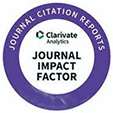STUDY ON THE RATE OF REDUCTION OF Cr(VI) TO Cr(III) BY HUMIC ACID USING CONTINUM MULTICOMPONENT MODEL
Uripto Trisno Santoso(1*), Herdiansyah Herdiansyah(2), Wega Trisunaryanti(3), Sri Juari Santosa(4)
(1) Program Studi Kimia Fakultas MIPA Universitas Lambung Mangkurat, Jl. Jend. A. Yani Km 35,8 Banjarbaru, Kalimantan Selatan 70714
(2) Program Studi Kimia Fakultas MIPA Universitas Lambung Mangkurat, Jl. Jend. A. Yani Km 35,8 Banjarbaru, Kalimantan Selatan 70714
(3) Chemistry Department, Faculty of Mathematics and Natural Sciences, Universitas Gadjah Mada, Yogyakarta
(4) Chemistry Department, Faculty of Mathematics and Natural Sciences, Universitas Gadjah Mada, Yogyakarta
(*) Corresponding Author
Abstract
The objective of this study is to develop a rate equation for reduction of Cr(VI) by humic acid (HA) using a continuum multicomponent model. HA was extracted from peat soil samples in Gambut Subdistrict, South Kalimantan. Parameters influencing the rate of reduction, i.e., medium acidity ([H+]), as well as initial humic acid concentrations ([HA]o) and initial Cr(VI) concentrations ([Cr(VI)]o) were critically evaluated.
Experiments were performed in triplicate tests. Aliquots of stock solution containing 100 mg/L HA were equilibrated for 24 h at pH 1.5, 2.05, 3.2, 5.6, and 6.5 before being spiked with 0.02 mM of Cr(VI). [Cr(VI)] was determined by 1,5-diphenylcarbazide spectrometric method. A similar set of rate experiments was conducted at a fixed pH of 1.5 and an [Cr(VI)]o of 0.02 mM and with [HA]o of 25, 50, 75, 100, 150, 200, and 250 mg/L. A third set of batch experiment was performed at pH 1.5, an [HA]o of 100 mg/L, and [Cr(VI)]o 0.01, 0.02, 0.05, 0.10, and 0.20 mM. The results showed that the rate of reduction cannot be adequately modeled by either a simple first- or second- order rate equation. A continum multicomponent model adequately describes the effect of solution parameters on the rates of Cr(VI) reduction.
Keywords
Full Text:
Full Text PdfReferences
[1] Kožuh, N., Štupar, J. and Gorenc, B., 2000, Environ. Sci. Technol., 34, 112-119.
[2] Richard, F.C. and Bourg, A.C.H, 1991, Wat. Res., 25, 807-8-6.
[3] Sperling, M., Xu, S. and Welz, B., 1992, Anal. Chem., 64, 3101-3108.
[4] WHO, 1981, Guidelines for Drinking Water Quality: Health Criteria and Other Supporting Information, 84-89, 111-118, 262-263.
[5] Anonim, 1991, Keputusan Menteri Negara Kependudukan and Lingkungan Hidup, No. Kep. 03/Men-KLH/1991 tentang Pedoman Penetapan Baku Mutu Lingkungan, Sekretariat Menteri Negara KLH, Jakarta.
[6] Sudjadi, M.,1984, Problem Soils in Indonesia and Their Managemen” (dalam Bay-Peterson, J. (ed.), Ecology and Management of Problem Soil in Asia, Food and Fertilzer Technology Center), Taipeh, Taiwan Republic of China.
[7] Notohadiprawiro, T., 1975, Kekhasan Faktor Tanah yang Menonjol dalam Pembudidayaan Kawasan Pasang Surut untuk Pertanian, (dalam Bay-peterson, J. (ed), Ecology and Manajement of Problem Soil in Asia, Food and Fertilzer Technology Center, Taipeh, Taiwan Republic of China.
[8] Driessen, P.M., 1978, Peat Soil, (dalam : IRRI, Soil and Rice), Los Banos, Philippines, 763-779.
[9] Witbrodt, P.R. and Palmer, C.D., 1995, Environ. Sci. Technol., 29, 255-263.
[10] Stevenson, F.J., 1994, Humus Chemistry: Genesis, Composition, Reaction, 2rd ed., John Wiley & Sons, New York.
[11] Riffaldi, R. and Schnitzer, M., 1972, Soil Sci. Soc. Am. Proc., 36, 301-307.
[12] Cotton , F.A., and Wilkinson, G., 1999, Inorganic Chemistry, 6th ed., John Wiley & Sons, New York.
[13] Aiken, G.R., McKnight, D.M., Wershaw, R.L. and MacCarthy, P., 1985, Humic Subtance in Soil, Sedimen and Water: Geochemistry, Isolation and Characterization, John Wiley & Sons, Ney York.
Article Metrics
Copyright (c) 2010 Indonesian Journal of Chemistry

This work is licensed under a Creative Commons Attribution-NonCommercial-NoDerivatives 4.0 International License.
Indonesian Journal of Chemistry (ISSN 1411-9420 /e-ISSN 2460-1578) - Chemistry Department, Universitas Gadjah Mada, Indonesia.












